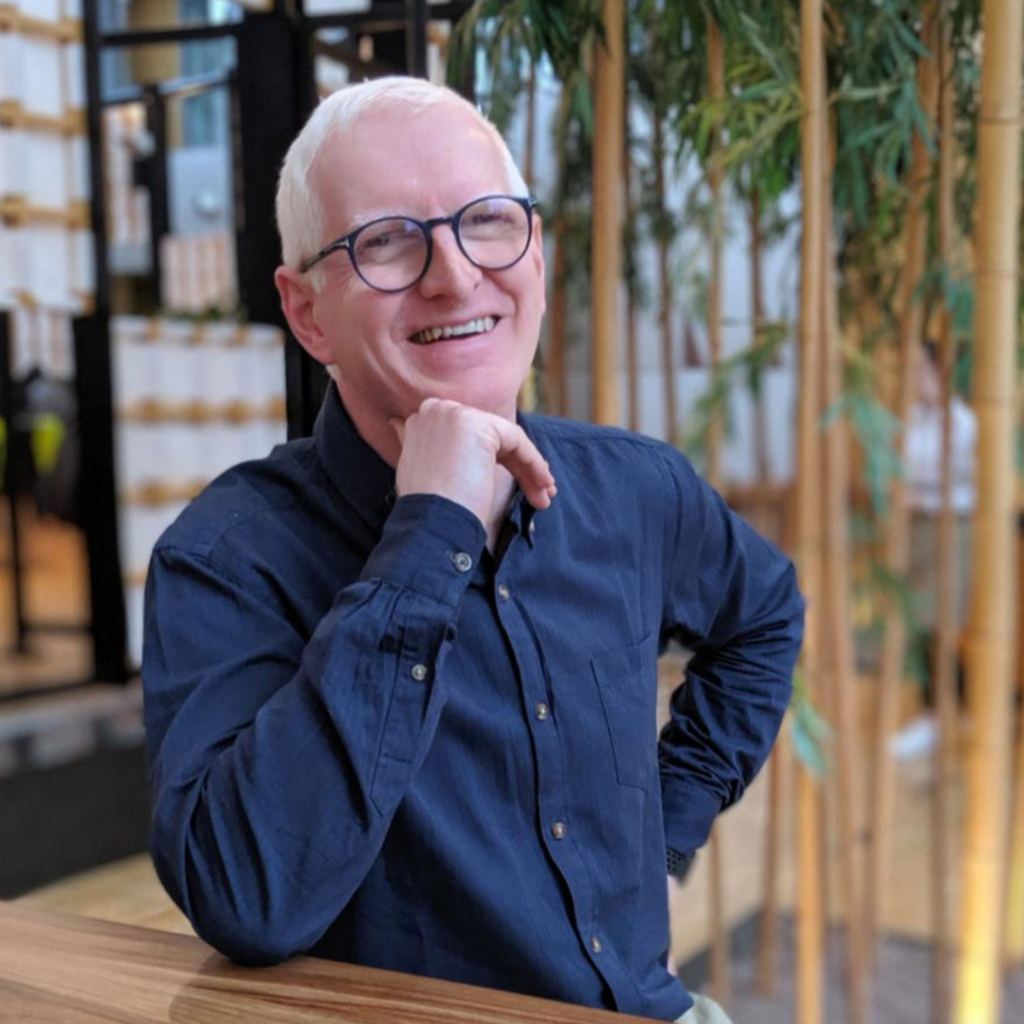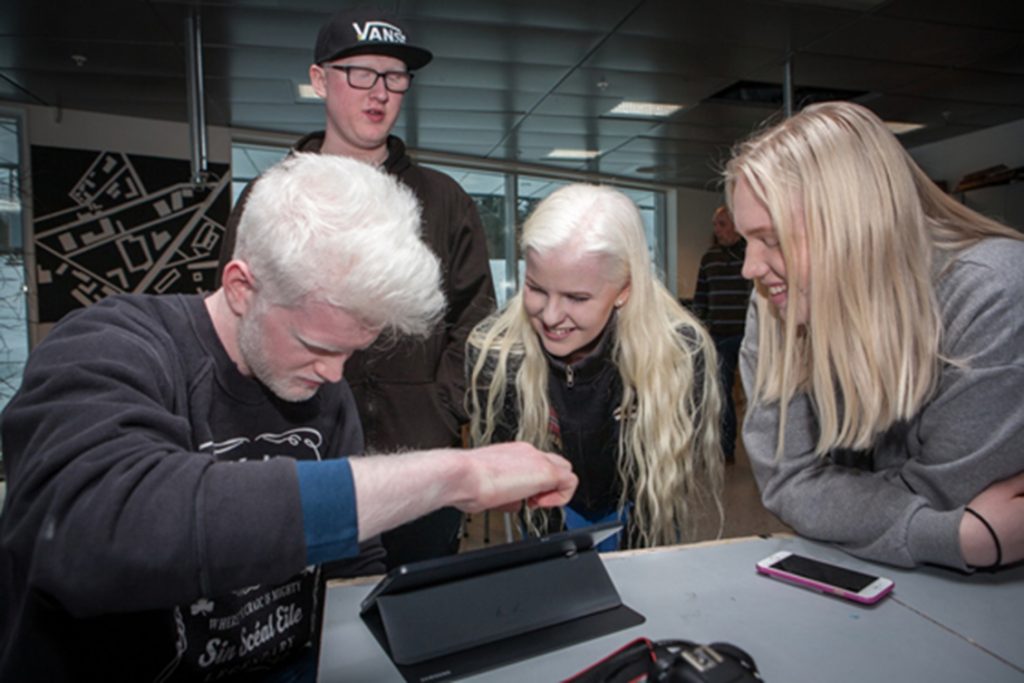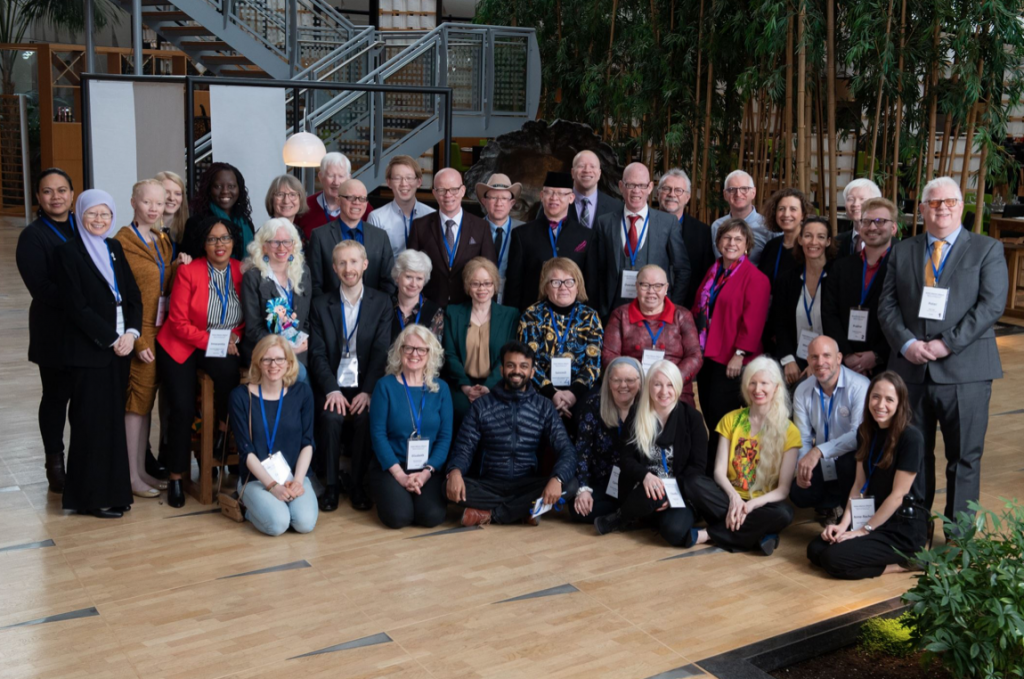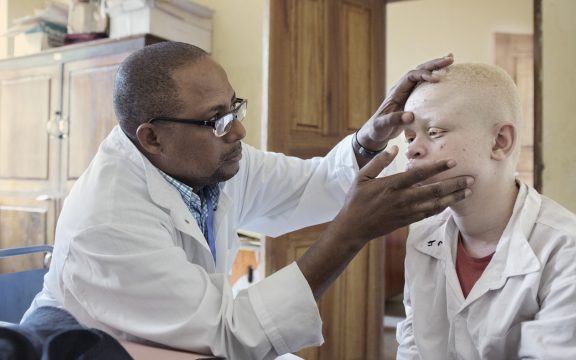“In Spain there are between 2500 and 3500 people with albinism but we still have a long way to go before this genetic condition is known.”
We talked to Pepe Solves, vice-president of the Association for the help of people with albinism in Spain (ALBA).
- Why did you decide to found ALBA in 2005 and what has been your work since then?
We created ALBA because we realized that there was a huge need for good information about albinism and because families needed someone to accompany them during the first years of life of their children with albinism. At that time it was very difficult to get good up-to-date information about albinism: there were very few websites, most of them in English, and we also noticed right away that families when they had a child with albinism felt bewildered, disoriented, scared…. That is why, from the beginning, ALBA’s goal has always been, on the one hand, to disseminate the best and most updated information possible about albinism and to accompany families in their concerns as soon as possible, that is, almost as soon as they have a child with albinism.
- What is the situation of people with albinism in Spain? What are still the main challenges they face today?
In a country like Spain, people with albinism have a very good quality of life. In fact, the major challenges facing a child with albinism and his or her family are, on the one hand, those related to low vision; that is, all children with albinism must see an ophthalmologist as soon as possible and receive early stimulation so that their visual system develops as well as possible from the very beginning. This is provided in Spain by ONCE, the Spanish National Organization for the Blind. Apart from this care, people with albinism have to take care of their vision throughout their lives, but ophthalmological care is improving day by day: we have the necessary means, the training of ophthalmological personnel is getting better and better, although much remains to be done, and technology is helping us a lot in the challenges that low vision presents for education and for social life in general.
The other great challenge for people with albinism in Spain is, logically, skin care. We have greatly improved education for prevention, so that today in Spain it is quite rare for people with albinism to develop skin cancer as a result of lesions caused by the sun.
The third major challenge that all people with albinism and their families continue to face is in the social sphere and has to do with educational, occupational and social integration. Although the training of educators and their ability to integrate children with albinism into the classroom has improved greatly in recent years, there is still much room for improvement. And it is undoubtedly still important to work with employers so that certain prejudices do not lead to discriminatory behavior against people with albinism, both in terms of their physical appearance and their visual impairment.
- Has the situation of people with albinism in Spain changed much in recent decades?
In recent years, accessible information on albinism has improved a lot, as well as the quality of that information. Social consideration of the difference, of the disability, has also improved, and this obviously benefits the group of people with albinism. Undoubtedly, the preparation of educators and health personnel has also improved. I honestly believe that ALBA has contributed to all this, although these changes have also come about because Spanish society itself has advanced as an open, democratic and plural society, which considers discrimination and inequality unacceptable. In particular, at ALBA we have noticed an extraordinary improvement in the self-esteem and psychological resources that children with albinism have acquired in recent years to face their challenges. And we believe this has to do with our work and with the efforts of families and administrations that work together to improve the quality of life of these children.
- How many people are diagnosed with some type of albinism in Spain each year?
Unlike other countries in our environment such as, for example, France, in Spain there is still no procedure in the public health system to diagnose people with albinism. Most of the diagnoses we have today have been made thanks to the Albinochip initiative of Dr. Luis Montoliu’s laboratory at the National Biotechnology Center, which by means of a simple and inexpensive procedure and from a saliva sample, is able to locate, in most cases, the specific genetic mutation and, therefore, the specific type of albinism of each person analyzed. However, this initiative is carried out by Dr. Montoliu’s laboratory, which obviously has limited means, making it difficult in some cases for people to be diagnosed in a short time. The consequence of this is that we do not know exactly how many people with albinism exist today in Spain, beyond an estimate of the incidence of this genetic condition, nor are all the people with albinism that we know diagnosed.
The estimate we currently have indicates that in Spain there are between 2,500 and 3,500 people with albinism, that is, one in every 10,000 to 20,000 people.
- What specific support do people with albinism receive?
Children with albinism receive the same attention at school as any child with low vision, that is, the optical aids provided by ONCE, as well as their support teachers, and the adaptations provided by law for children with this type of disability. Beyond that, children with albinism can access the financial aid or scholarships for which any child with low vision is eligible. And when they are adults, people with albinism can access the aid that the State or the Autonomous Communities have provided for people with visual impairment. On the other hand, there is no aid for the purchase of sun protection creams or clothing: this is something ALBA is still working on because we believe that creams can no longer be considered cosmetics, and we hope that they will soon be considered medicines or, in any case, part of the public health services portfolio. ALBA, for its part, has been trying for some years to develop programs to help in the acquisition of technological material for education, which means that we help in the acquisition of laptops or digital tablets, because we believe that this type of technology, as I said before, can help people with albinism to access to a better training and a better professional development.
- What projects does ALBA develop to support people with albinism?
On the one hand, ALBA organizes an annual conference in which experts in dermatology, ophthalmology and genetics explain the latest developments in these fields of research and take the opportunity to share tips for vision and skin care and to resolve doubts. In addition, activities for all ages and to promote intergenerational coexistence and learning, as well as mutual support, are carried out during these days. In fact, I believe that this is ALBA’s fundamental project. On the other hand, we have always worked in the preparation and dissemination of good information about albinism and, in that sense, we have published several books with testimonies, photographs and studies, with which our associates or anyone interested in albinism can access reliable and updated information about this genetic condition, the limitations and challenges that people with albinism face every day, and, above all, the solutions that research, medicine, education, sport, etc., provide to help these people in their lives, provide to help these people in facing all these challenges.
Since 2014, ALBA has been developing, together with other European associations, projects in which we have addressed some of these issues to overcome myths, to provide solutions to challenges in the educational and technological field, as well as to enhance the practice of sports among people with albinism, insofar as it is an activity that improves the quality of life and facilitates the social integration of these people.
- At present, is albinism still an unknown genetic condition in Spain?
Social ignorance of some genetic conditions is difficult to improve because too often we access reality through stereotypes and prejudices based on little knowledge of groups and social issues.
In ALBA we are convinced that all our work is bearing fruit and we see it in the capacity that our children now have to face their challenges, which is very different from that of the people with albinism of my generation, for example. And we note with satisfaction the importance that the International Albinism Awareness Day has acquired or that the information that is appearing in the mass media is becoming more exhaustive, more rigorous; in other words, the treatment of this genetic condition is becoming more and more appropriate. However, we are also aware that we still have a long way to go to make albinism a generally known genetic condition. For example, we have not yet succeeded in getting society to relate albinism to low vision: that is, in general, people who do not have a person with albinism in their environment do not know that these people always have a severe visual impairment, and that, in fact, this low vision is precisely the characteristic common to all types of albinism, which, in some cases, pigment more and, in others, less, but which are always associated with low vision. We are having a hard time spreading the word about this relationship between albinism and low vision.
And we are also having a hard time getting people to understand that there are many types of albinism and that some of them do not correspond to the stereotypical image of people with albinism with light skin, hair and eyes. On the other hand, and as I have already said, we still have a lot of work to do with health personnel and educators: we have to greatly improve the knowledge that these professionals have about albinism. In conclusion: we are improving social knowledge about albinism, but we still have a long way to go.
- Do you develop international alliances between the various albinism associations around the world?
Indeed, in early 2020, a group of 30 delegates from associations around the world met in Paris with the aim of creating a global albinism alliance. ALBA was at that meeting representing the European associations and, since then, we have supported the Alliance in all its research and initiatives. Moreover, we have also collaborated since 2015 with the United Nations independent experts for people with albinism and, as I mentioned before, we have been developing joint projects with other European associations for years. More recently, moreover, we have initiated increasingly intense collaborative relationships with Latin American associations of people with albinism and we will shortly initiate concrete projects with them.
What Beyond Suncare is doing is absolutely immeasurable: first of all, because it is saving thousands of lives: it is developing a cancer prevention activity that is already showing in the lower incidence of this disease among people with albinism where Beyond is active. Skin cancer among people with albinism in Africa is not just a threat, but a dramatic reality: their unprotected exposure to the sun means that these people have a life expectancy of around 30 years; and, in fact, this is a type of cancer that can be perfectly avoided if this prevention work is carried out. So Beyond’s activity is absolutely crucial. On the other hand, Beyond is also developing an impressive activity in the educational field of people with albinism and their families, but also in their school and family environment, and in the social environment in general, which is going to be fundamental and is already being fundamental in all these contexts, in all these countries: because the key to social change is always in education and because the key to many diseases is precisely in prevention.







